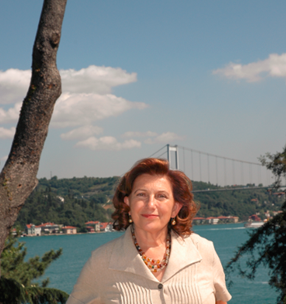Edit Content

Gate 27, farklı pratiklerin araştırma ve üretim süreçlerini desteklemek ve disiplinlerarası etkileşime zemin yaratmak amacıyla 2019’da kurulmuş bir uluslararası konuk sanatçı programıdır.

Gate 27, farklı pratiklerin araştırma ve üretim süreçlerini desteklemek ve disiplinlerarası etkileşime zemin yaratmak amacıyla 2019’da kurulmuş bir uluslararası konuk sanatçı programıdır.
Dr. Nazan Ölçer was born in Istanbul. She received her primary and middle school education in Yeniköy Primary School and Saint George Austrian High School, respectively. Ölçer received her bachelor’s and master’s degrees from Ludwig Maximilian University, Munich between the years 1962 and 1969, studying art history, ancient history and the history of ethnology and culture.
In 1972, Ölçer began her work at the Museum of Turkish and Islamic Arts in Istanbul. In 1975 and 1978, she worked as a guest curator for the Museum of Ethnology, Vienna and Museum of Islamic Art, Berlin. In 1978, Ölçer was appointed as the Director of the Museum of Turkish and Islamic Arts in Istanbul. Concurrent to her post as museum director, she worked as a teaching fellow at the postgraduate programs at Yıldız Technical University, Faculty of Architecture. In 2003, following the 25 years of directorship the Museum of Turkish and Islamic Arts, Istanbul, Ölçer undertook her current post as the director of the then newly founded Sakıp Sabancı Museum, which would later be bequeathed to Sabancı University.
Nazan Ölçer has participated in archaeological, ethno-archaeological, historical and art historical fieldwork throughout different regions of Anatolia since 1974. As part of her fieldwork, Ölçer conducted research on the Adana Karatepe excavations between 1973-1977, on the Uşak Selçikler excavations between 1974-1978, and on the settlement of the Beritan and Alikan tribes in the southeastern Anatolia region in 1979. During this period, she participated in excavations and museum studies, conducting extensive surveys related to the construction of dams in regions at risk of flooding. She administered the documentation of artists working in traditional arts centered around Istanbul and the neighbouring cities of Edirne and Bursa. These studies have been incorporated into the archives of the Göttingen University Film Archive, Germany and the archives of the University of Vienna Film Center and Istanbul University Film Center.
Ölçer has contributed to numerous research publications on the history of culture, museology, and Ottoman carpets and metalwork. She has participated in the organization and curation of various international exhibitions in Turkey, Europe, Eastern Asian countries and the United States. She currently serves as a member of the International Council of Museums (ICOM), UNESCO’s commission of investigation of displaced cultural heritage, and the international advisory committee of the Humboldt Forum incorporated by the Berlin Humboldt University.
Ölçer has received high-ranking distinctions from Germany, Poland, Italy, France, Switzerland and Russia, as well as L’Ordre National de la Légion d’Honneur granted by the presidency of the French Republic. Ölçer has also received the order of merit and other awards from the presidency and the Ministry of Culture of the Republic of Turkey.

Dr. Nazan Ölçer was born in Istanbul. She received her primary and middle school education in Yeniköy Primary School and Saint George Austrian High School, respectively. Ölçer received her bachelor’s and master’s degrees from Ludwig Maximilian University, Munich between the years 1962 and 1969, studying art history, ancient history and the history of ethnology and culture.
In 1972, Ölçer began her work at the Museum of Turkish and Islamic Arts in Istanbul. In 1975 and 1978, she worked as a guest curator for the Museum of Ethnology, Vienna and Museum of Islamic Art, Berlin. In 1978, Ölçer was appointed as the Director of the Museum of Turkish and Islamic Arts in Istanbul. Concurrent to her post as museum director, she worked as a teaching fellow at the postgraduate programs at Yıldız Technical University, Faculty of Architecture. In 2003, following the 25 years of directorship the Museum of Turkish and Islamic Arts, Istanbul, Ölçer undertook her current post as the director of the then newly founded Sakıp Sabancı Museum, which would later be bequeathed to Sabancı University.
Nazan Ölçer has participated in archaeological, ethno-archaeological, historical and art historical fieldwork throughout different regions of Anatolia since 1974. As part of her fieldwork, Ölçer conducted research on the Adana Karatepe excavations between 1973-1977, on the Uşak Selçikler excavations between 1974-1978, and on the settlement of the Beritan and Alikan tribes in the southeastern Anatolia region in 1979. During this period, she participated in excavations and museum studies, conducting extensive surveys related to the construction of dams in regions at risk of flooding. She administered the documentation of artists working in traditional arts centered around Istanbul and the neighbouring cities of Edirne and Bursa. These studies have been incorporated into the archives of the Göttingen University Film Archive, Germany and the archives of the University of Vienna Film Center and Istanbul University Film Center.
Ölçer has contributed to numerous research publications on the history of culture, museology, and Ottoman carpets and metalwork. She has participated in the organization and curation of various international exhibitions in Turkey, Europe, Eastern Asian countries and the United States. She currently serves as a member of the International Council of Museums (ICOM), UNESCO’s commission of investigation of displaced cultural heritage, and the international advisory committee of the Humboldt Forum incorporated by the Berlin Humboldt University.
Ölçer has received high-ranking distinctions from Germany, Poland, Italy, France, Switzerland and Russia, as well as L’Ordre National de la Légion d’Honneur granted by the presidency of the French Republic. Ölçer has also received the order of merit and other awards from the presidency and the Ministry of Culture of the Republic of Turkey.
© 2023 GATE 27